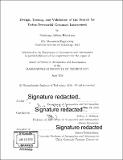Design, testing, and validation of the search for Extra-Terrestrial Genomes instrument
Author(s)
Bhattaru, Srinivasa Aditya
DownloadFull printable version (6.756Mb)
Other Contributors
Massachusetts Institute of Technology. Department of Aeronautics and Astronautics.
Advisor
Jeffrey A. Hoffman.
Terms of use
Metadata
Show full item recordAbstract
The development of any spaceflight instrument involves a systematic, iterative process of design, testing, and validation. This ensures that the system developed will meet the needs of stakeholders while minimizing costs and risks. Here, the needs for a life-detection instrument targeting nucleic acids are identified, the objectives for that instrument are determined, and system engineering analysis is used to demonstrate that a Search for Extra-Terrestrial Genomes instrument would fulfill those objectives and is feasible for a rover mission. Additionally, we show our design and build process for a testbed to rapidly prototype SETG components and subsystems, which has successfully automated nucleic acid extraction, sequencer loading, and parts of library preparation. We also experiment with thermal simulations and conduct a sequencing test at Martian conditions, using a custom built thermal vacuum chamber system. Finally, this thesis explores potential avenues for future development and identifies short term and long term engineering goals that would assist the SETG team in developing an instrument prototype.
Description
Thesis: S.M., Massachusetts Institute of Technology, Department of Aeronautics and Astronautics, 2018. Cataloged from PDF version of thesis. Includes bibliographical references (pages 75-78).
Date issued
2018Department
Massachusetts Institute of Technology. Department of Aeronautics and AstronauticsPublisher
Massachusetts Institute of Technology
Keywords
Aeronautics and Astronautics.